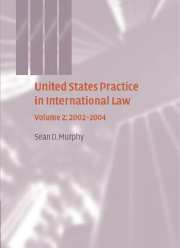Book contents
- Frontmatter
- Contents
- Foreword by Judge Stephen M. Schwebel
- Acknowledgments
- Table of Periodical Abbreviations
- Table of Cases
- Table of U.S. Statutes
- Table of Treaties
- I General International and U.S. Foreign Relations Law
- II State Diplomatic and Consular Relations
- III State Jurisdiction and Immunities
- IV State Responsibility and Liability
- V International Organizations
- VI International Oceans, Environment, Health, and Aviation Law
- VII International Economic Law
- VIII International Human Rights
- IX International Criminal Law
- X Use of Force and Arms Control
- XI Settlement of Disputes
- XII Private International Law
- Annex
- Index
III - State Jurisdiction and Immunities
Published online by Cambridge University Press: 10 December 2009
- Frontmatter
- Contents
- Foreword by Judge Stephen M. Schwebel
- Acknowledgments
- Table of Periodical Abbreviations
- Table of Cases
- Table of U.S. Statutes
- Table of Treaties
- I General International and U.S. Foreign Relations Law
- II State Diplomatic and Consular Relations
- III State Jurisdiction and Immunities
- IV State Responsibility and Liability
- V International Organizations
- VI International Oceans, Environment, Health, and Aviation Law
- VII International Economic Law
- VIII International Human Rights
- IX International Criminal Law
- X Use of Force and Arms Control
- XI Settlement of Disputes
- XII Private International Law
- Annex
- Index
Summary
OVERVIEW
During the course of 2002–2004, numerous cases involving transnational activity arose in U.S. courts, requiring those courts to consider various issues, such as whether they had jurisdiction over a foreign defendant, whether they should exercise jurisdiction over suit by a foreign plaintiff against a foreign defendant, and, if jurisdiction did exist, whether U.S. or foreign law should apply to the dispute. There were also numerous cases in U.S. courts concerning the immunity of a foreign state or its instrumentalities from the jurisdiction of U.S. courts. These cases, brought pursuant to the Foreign Sovereign Immunities Act (FSIA), typically entailed the interpretation of one of the several exceptions to sovereign immunity contained in the FSIA, such as whether the immunity had been waived or whether the state had engaged in a commercial activity giving rise to the action. A particularly robust area of litigation involved an exception to sovereign immunity enacted in 1996 covering situations where a foreign terrorist state causes injury or death by an act of torture, extrajudicial killing, or certain other serious actions. Numerous high-profile judgments were issued under this exception and concerns with the ability of claimants to execute those judgments against foreign state assets led to further amendments of the law. Finally, various cases also arose concerning the diplomatic and consular immunities of individuals, as well as “head of state” immunity, such as a case concerning China's former president, Jiang Zemin.
- Type
- Chapter
- Information
- United States Practice in International Law , pp. 41 - 85Publisher: Cambridge University PressPrint publication year: 2006



